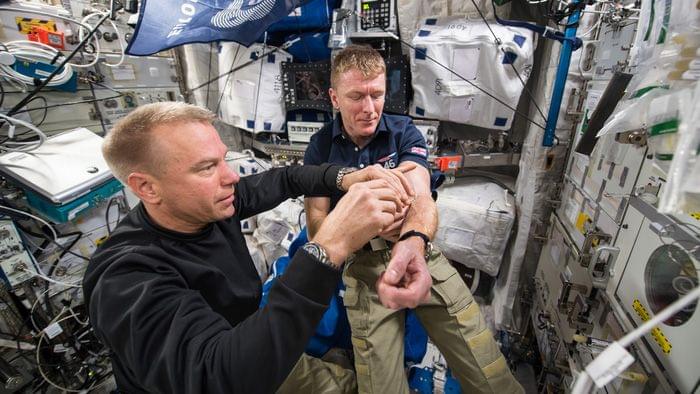Page 177
Jan 20, 2022
Spaceflight makes the body kill red blood cells and it doesn’t get better after landing
Posted by Genevieve Klien in category: biotech/medical
Space anemia is more serious than we thought.
Being in space causes the human body to destroy about 50% more red blood cells, leading to a potentially dangerous condition known as anemia. The effects persist even after astronauts return to Earth, according to a new study.
The study, led by researchers at the Ottawa Hospital and the University of Ottawa in Ontario, Canada, analyzed breath and blood samples of 14 astronauts before, during, and after their six-month missions aboard the International Space Station. The researchers found that the astronaut’s bodies destroyed about 54% more red blood cells than they would on Earth.
Jan 20, 2022
World’s First 3D-Printed Prosthetic Eye
Posted by Kelvin Dafiaghor in categories: 3D printing, biotech/medical, cyborgs
TALLAHASSEE, Florida — A London patient, Steve Verze, became the first to use a 3D-printed prosthetic eye in November 2021. Its advancements in aesthetics, durability and production process allude to an auspicious future for prosthetics. Yet, developing countries struggle regarding prosthetic accessibility and affordability. Losing a limb or organ in poverty is extremely impactful since access to prosthetic devices or assistance is rare.
A 3D Difference
Steve Verze made history by replacing his acrylic eye with a 3D-printed prosthetic. Since he was 20 years old, he has worn a prosthetic and expressed that he was always self-conscious wearing it. The difference between his previous eye and the 3D counterpart is wider than expected. Traditional prosthetic eyes take six weeks to finish due to hand painting acrylic. The 3D printing prosthetic takes two to three weeks in comparison. Acrylic eyes require an anesthetic for children due to the challenge of molding them to the eye socket. The 3D eye only uses digital scans and “is a true biomimetic and a more realistic prosthetic, with clearer definition and a real depth to the pupil.” The world’s first 3D-printed prosthetic eye shows advancements that expand the possibilities of prosthetics forever.
Jan 20, 2022
Why The Universe May Be Full Of Alien Civilizations Featuring Dr. Avi Loeb
Posted by Dan Breeden in category: alien life

In our first episode of John Michael Godier’s Event Horizon, we discuss the possibility of Alien civilizations moving to Galaxy Clusters to make the best use of mass and energy, why making copies of ourselves may be the key to interstellar travel and colonization, the habitability of planets around red dwarf stars such as Proxima Centauri, Black Holes, and so much more with our first guest Harvard Theoretical Physicist Dr. Avi Loeb, the Frank B. Baird Jr. Professor of Science at Harvard University.
Is Oumuamua a Light Sail? With Avi Loeb: https://youtu.be/VlpVIyBCG3s.
Continue reading “Why The Universe May Be Full Of Alien Civilizations Featuring Dr. Avi Loeb” »
Jan 20, 2022
BMW reveals colour-changing car
Posted by Future Timeline in categories: futurism, transportation
German carmaker BMW has demonstrated the use of electrophoretic technology, enabling a vehicle’s surface to rapidly change colour. The futuristic concept has potential for a number of interior and exterior applications.
Jan 20, 2022
Why Timnit Gebru Isn’t Waiting for Big Tech to Fix AI’s Problems
Posted by Gemechu Taye in categories: education, health, policy, robotics/AI, surveillance
For the past decade, AI has been quietly seeping into daily life, from facial recognition to digital assistants like Siri or Alexa. These largely unregulated uses of AI are highly lucrative for those who control them but are already causing real-world harms to those who are subjected to them: false arrests; health care discrimination; and a rise in pervasive surveillance that, in the case of policing, can disproportionately affect Black people and disadvantaged socioeconomic groups.
Gebru is a leading figure in a constellation of scholars, activists, regulators, and technologists collaborating to reshape ideas about what AI is and what it should be. Some of her fellow travelers remain in Big Tech, mobilizing those insights to push companies toward AI that is more ethical. Others, making policy on both sides of the Atlantic, are preparing new rules to set clearer limits on the companies benefiting most from automated abuses of power. Gebru herself is seeking to push the AI world beyond the binary of asking whether systems are biased and to instead focus on power: who’s building AI, who benefits from it, and who gets to decide what its future looks like.
Full Story:
Continue reading “Why Timnit Gebru Isn’t Waiting for Big Tech to Fix AI’s Problems” »
Jan 20, 2022
Three Former SpaceX Engineers Are Designing New, Ultra-Efficient Autonomous Trains
Posted by Gemechu Taye in categories: robotics/AI, transportation

And they can detach while still in motion.
Three former SpaceX engineers launched a company to develop autonomous battery-electric trains that they believe can help to improve the efficiency and emissions of railroads, a press statement reveals.
Jan 20, 2022
Community Of AI Researchers, Practitioners Calls For Stringency In Toronto Police Services Board’s Use Of AI Technologies Policy
Posted by Gemechu Taye in categories: information science, policy, robotics/AI
“No AI technology ‘where training or transactional data is known to be of poor quality, carry bias, or where the quality of such data is unknown’ should ever be considered for use, and thus should be deemed Extreme Risk, not High Risk. Any AI technology based on poor quality or biased data is inherently compromised.”
“No AI technology that assists in “identifying, categorizing, prioritizing or otherwise making decisions pertaining to members of the public” should be deemed Low Risk. Automating such actions through technology, even with the inclusion of a human-in-the-loop, is an intrinsically risky activity, and should be categorized as such by the Policy.”
Full Story:
Jan 20, 2022
Mercedes Signs On To Use Luminar Lidar In Its Luxury Cars, Invests In Laser Sensor Maker
Posted by Gemechu Taye in categories: robotics/AI, transportation
Luminar, a laser lidar startup led by one of the youngest U.S. billionaires, has a new partnership with Mercedes-Benz that includes supplying sensors for its luxury vehicles and gathering on-road data from them to improve automated driving. The German carmaker also bought a small stake in the tech company.
Luminar’s Iris lidar will be integrated into future Mercedes planned for its next-generation platform to improve safety and help them operate autonomously during highway driving, the companies said. Details including specific models that will use the sensor and when they’ll be available for sale to customers aren’t being disclosed. Mercedes also acquired 1.5 million Luminar shares as part of the partnership, founder and CEO Austin Russell, 26, tells Forbes.
Full Story:
Jan 20, 2022
Science of Aliens, Part 9: Was Humanity Visited in Ancient History?
Posted by Dirk Schulze-Makuch in category: science
Records of Unidentified Aerial Phenomena (UAP) in ancient history: what they tell us and what not.
An analysis of UAP in classical antiquity.
Continue reading “Science of Aliens, Part 9: Was Humanity Visited in Ancient History?” »
















